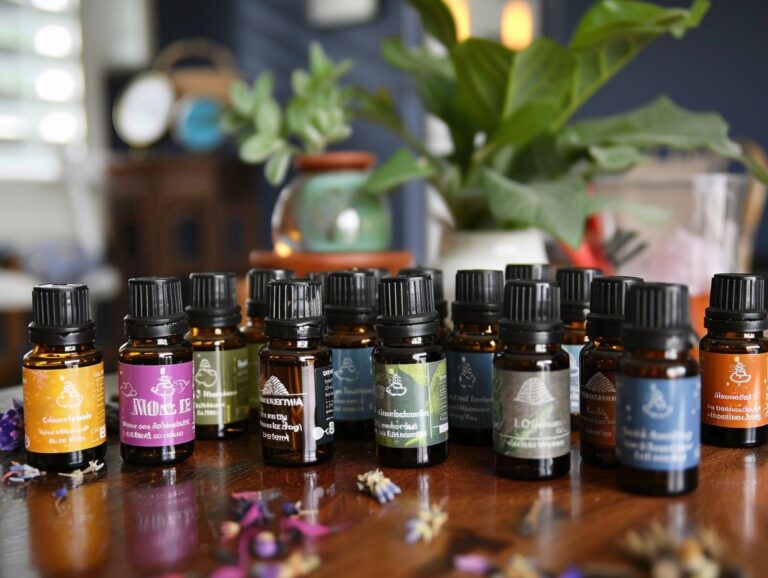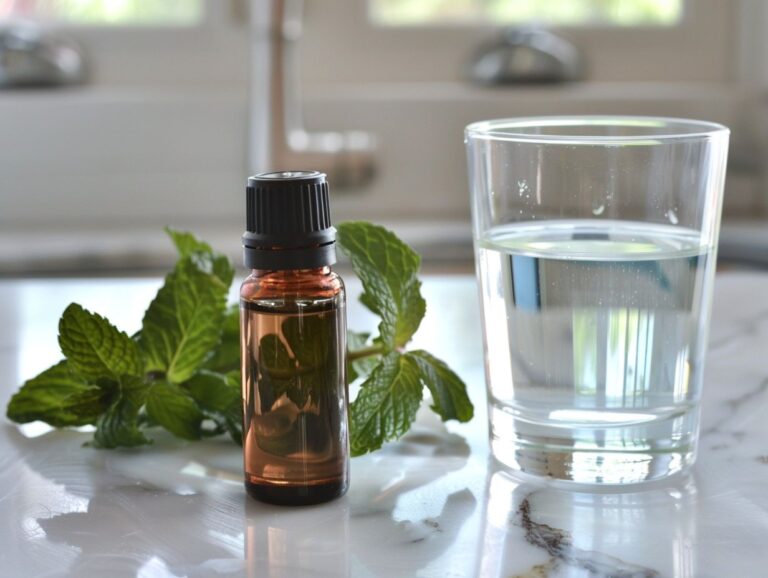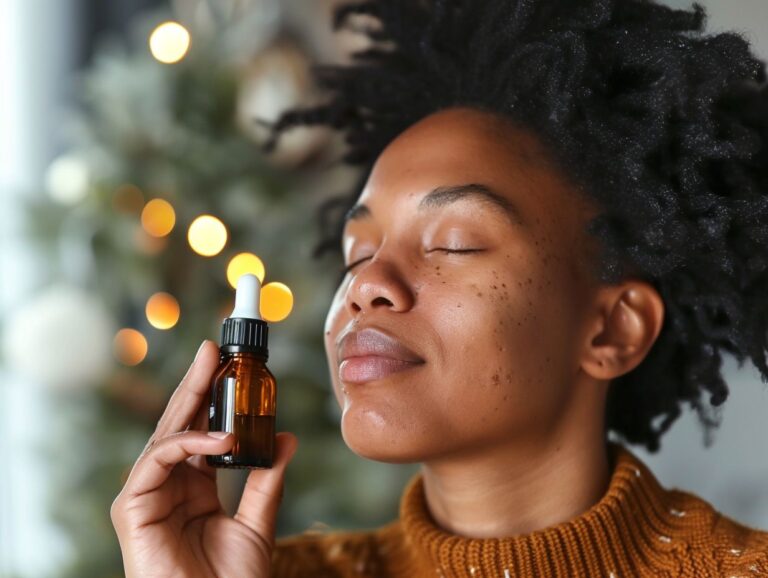How Long Do Essential Oils Stay in Your Bloodstream
Essential oils have gained popularity for their various health benefits. Have you ever wondered how long they actually stay in your bloodstream?
We will explore what essential oils are, how they enter the body, and their role once inside. Additionally, we will discuss the factors that affect the duration of essential oils in the bloodstream, the benefits they provide, as well as the potential risks.
Discover tips on how to safely use essential oils to reap their full potential. Learn all about essential oils and how they can impact your health.
Key Takeaways:
What Are Essential Oils?
Essential oils are highly concentrated plant extracts that capture the aromatic compounds and properties of various plants.
These oils are extracted through various methods including steam distillation, cold pressing, or solvent extraction, depending on the plant material and desired outcome. The process involves carefully collecting the essence of the plant, which can be found in different parts such as the flowers, leaves, bark, roots, or fruits. What sets essential oils apart is their potent fragrance that is not only pleasant but also holds therapeutic benefits, making them widely used in aromatherapy and natural wellness practices.
How Do Essential Oils Enter the Body?
Essential oils can enter the body through inhalation, topical application, and ingestion, where they are absorbed into the bloodstream and body tissues.
When inhaled, essential oils enter the body through the nasal passages, where the olfactory receptors send signals to the limbic system, impacting emotions and mood.
Through topical application, oils are absorbed through the skin, reaching the bloodstream and affecting local tissues.
For ingestion, oils are consumed orally, passing through the digestive tract. Once in the bloodstream, these oils can travel to different parts of the body, interacting with organs and tissues.
What Is the Role of Essential Oils in the Body?
Essential oils play a significant role in the body by interacting with the skin, metabolizing compounds, entering the bloodstream, and being processed by the liver into metabolites.
When essential oils come into contact with the skin, their chemical components seep through the epidermis, the outer layer of the skin, and can penetrate deeper layers. Once absorbed, these compounds enter the bloodstream, where they are circulated throughout the body. Through the complex network of blood vessels, these oils can reach various organs and tissues, influencing physiological processes and promoting overall well-being. The liver serves as a crucial organ in breaking down these compounds, transforming them into metabolites that can be safely eliminated from the body. This intricate process highlights the profound impact essential oils can have on one’s health and vitality.
How Do Essential Oils Affect the Body?
Essential oils affect the body through their therapeutic properties, aromatic effects, and synergistic interactions with body components, promoting overall health and well-being through inhalation, topical application, and ingestion.
When inhaled, essential oils can have immediate effects on emotions and mood by interacting with the olfactory system, triggering responses in the brain’s limbic system which regulates emotions. Their aromatic influences have been instrumental in promoting relaxation, reducing stress, and improving mental clarity. Through topical application, essential oils are absorbed through the skin, entering the bloodstream and affecting various physiological processes.
Lavender oil, for instance, is known for its calming effects and can be applied topically to promote relaxation and improve sleep quality.
How Long Do Essential Oils Stay in the Bloodstream?
The duration for which essential oils stay in the bloodstream can vary based on factors such as the location of skin application, individual metabolism, and absorption rates.
When essential oils are applied to areas with high vascularity, such as wrists or temples, they may enter the bloodstream more rapidly than when applied to less vascular areas like the soles of the feet.
Individual metabolic rates also play a crucial role in how long essential oils linger in the bloodstream. Metabolism varies from person to person and can influence the speed at which compounds are broken down and eliminated.
The specific absorption kinetics of each oil further determine the duration of presence in the bloodstream. Some oils are quickly absorbed, leading to a shorter stay, while others have slower absorption rates, prolonging their effects within the body.
What Factors Affect the Duration of Essential Oils in the Bloodstream?

Regarding the size of blood vessels, smaller vessels may limit the rapid diffusion of essential oils, prolonging their presence in the bloodstream. The efficiency of blood circulation plays a crucial role as well, as faster circulation can facilitate quicker removal of oils from the bloodstream.
The molecular properties of the essential oils also affect their longevity in the body. For instance, oils with smaller molecular sizes are often absorbed faster compared to larger molecules, which could lead to shorter duration in the bloodstream.
The skin’s characteristics, such as the presence of sebaceous glands, impact the absorption and retention of essential oils. The skin’s ability to absorb oils differs based on factors like thickness, hydration levels, and overall health.
What Are the Benefits of Essential Oils in the Bloodstream?
Essential oils in the bloodstream offer various benefits such as boosting immunity, reducing inflammation, improving mental health, and supporting digestive health.
When these essential oils are present in the bloodstream, they can work wonders for the body. For instance, certain oils like lavender or peppermint can calm the nervous system, helping with reducing stress and anxiety levels.
Oils such as lemon or ginger can aid in improving digestion and alleviating digestive discomfort. The anti-inflammatory properties of oils like frankincense or eucalyptus help in reducing swelling and pain, making them essential for those dealing with chronic conditions.
The immune-boosting abilities of oils like tea tree or oregano can help the body fight off infections and illnesses effectively.
Boosting Immunity
Essential oils in the bloodstream can enhance immunity through their synergistic effects and therapeutic benefits, supporting the body’s natural defense mechanisms.
When these potent oils are inhaled or applied, they interact with the body’s cells, promoting a balanced immune response. Some oils like lavender and tea tree possess antibacterial properties, while others like eucalyptus and peppermint can help clear congestion, aiding the respiratory system. The aromatic compounds in these oils stimulate the limbic system, which plays a crucial role in regulating emotions and behavior. The anti-inflammatory and antioxidant properties of oils such as frankincense and lemon can combat free radicals and protect cells. Through these diverse mechanisms, essential oils contribute significantly to fortifying the body’s immune response.
Reducing Inflammation
Essential oils present in the bloodstream can help reduce inflammation by modulating metabolic processes, requiring appropriate dilution and leveraging specific components for their anti-inflammatory effects.
Inflammation is a natural response of the body to protect itself from harm, but when it becomes chronic, it can lead to various health issues. Essential oils have been studied for their ability to combat inflammation, with research suggesting that they can influence metabolic pathways to help regulate the body’s response. Dilution of essential oils is crucial to avoid skin irritation or adverse reactions, typically done by mixing them with carrier oils or water.
Key components found in many essential oils, such as limonene, linalool, and eugenol, have demonstrated potent anti-inflammatory properties. These components can target inflammatory pathways and reduce the release of pro-inflammatory molecules, providing relief from conditions like arthritis, muscle soreness, and skin irritations.
Improving Mental Health
Essential oils in the bloodstream play a role in improving mental health by interacting with specific components that impact emotional well-being through inhalation and stimulation of the limbic system.
When inhaled, essential oils trigger a cascade of responses in the limbic system, which is the part of the brain responsible for emotions, memories, and behaviors. The molecules of these oils are small enough to cross the blood-brain barrier, influencing neurotransmitter activity and promoting feelings of relaxation or alertness.
Various essential oil compounds, such as linalool in lavender oil or limonene in citrus oils, have been shown to have direct effects on neurotransmitters like serotonin and dopamine, known for regulating mood and emotional stability. By modulating these neurotransmitters, essential oils can help create a sense of calm or uplift in individuals struggling with stress, anxiety, or mood disorders.
Supporting Digestive Health
Essential oils can support digestive health when present in the bloodstream, offering therapeutic benefits through ingestion and absorption mechanisms that aid gastrointestinal functions.
When these potent extracts are ingested, they travel through the digestive system, directly impacting various organs like the stomach, liver, and intestines. The beneficial compounds in essential oils help to stimulate enzyme production, promote healthy gut flora, and support proper digestion.
The high bioavailability of essential oils ensures efficient absorption in the body, allowing their active components to reach target areas swiftly. This quick assimilation contributes to their rapid therapeutic effects on digestive issues like bloating, indigestion, and stomach discomfort. Incorporating essential oils into your wellness routine can help maintain a balanced digestive system and promote overall gastrointestinal wellness.
Are There Any Risks of Essential Oils in the Bloodstream?

Although essential oils have gained popularity for their therapeutic properties, it’s essential to recognize that they are highly concentrated substances that can lead to complications when entering the bloodstream. Sensitivities to certain oils can vary widely among individuals, leading to allergic reactions or skin irritations. When these oils interact with medications, they may interfere with drug metabolism or enhance side effects.
It’s crucial to consult with a healthcare professional before using essential oils internally to minimize the risk of adverse effects and ensure safety. Proper dosage, dilution, and method of administration play a significant role in mitigating potential dangers when incorporating these oils into your wellness routine.
Adverse Reactions
Adverse reactions to essential oils in the bloodstream can occur, highlighting the importance of safety measures and recognizing individual sensitivities to specific compounds.
When essential oils enter the bloodstream, they have the potential to interact with medications, potentially leading to unwanted side effects or drug interactions. Some oils can cause skin irritation when used topically, and this sensitivity can be amplified if applied improperly or in high concentrations. It’s crucial to dilute oils properly and perform patch tests before widespread application to avoid adverse skin reactions. Certain essential oils like citrus oils can be phototoxic, increasing sensitivity to UV light and possibly causing skin damage without proper precautions.
Interactions with Medications
Essential oils in the bloodstream may interact with prescription medications, necessitating caution and consultation with healthcare providers to avoid potential adverse effects.
Before incorporating essential oils into your routine, it is crucial to recognize their potential impact on how prescription drugs work within the body. Certain essential oils contain compounds that can affect enzymes responsible for drug metabolism, which could lead to altered drug levels in the bloodstream. This alteration may either increase or decrease the efficacy of the medication, posing risks to your health.
Without proper guidance, these interactions can be unpredictable and may result in adverse effects. It is imperative to seek advice from a healthcare professional, such as a doctor or a pharmacist, who can provide personalized recommendations based on your specific health conditions and medication regimen.
How Can You Safely Use Essential Oils in the Bloodstream?
To safely use essential oils in the bloodstream, it is crucial to follow proper dilution practices, opt for high-quality oils, and seek guidance from a professional such as a registered aromatherapist or healthcare provider.
When incorporating essential oils into the bloodstream, remember that most oils are highly concentrated and may cause skin irritation or other adverse reactions if used undiluted. Dilution ratios can vary based on the type of oil and individual sensitivity, so it’s recommended to start with a low concentration and gradually increase as needed.
- When selecting essential oils, prioritize those that are 100% pure and organic to ensure maximum effectiveness and safety. Avoid synthetic fragrances or additives that may diminish the therapeutic benefits.
- Consulting with a professional, such as an aromatherapist or healthcare practitioner, is essential to determine the most suitable oils and usage methods for your specific needs.
- Remember that each individual may react differently to essential oils, so it’s crucial to perform a patch test before applying them on a larger area or ingesting them.
Dilute Properly
Proper dilution of essential oils is essential to prevent adverse reactions, considering the concentration levels, suitable carrier oils, and individual metabolic responses.
Essential oils are highly concentrated plant extracts that offer a range of benefits, from relaxation to immune support. When used in their pure form, they can be too potent and may lead to skin irritation, allergic reactions, or even toxicity. Diluting essential oils with a carrier oil significantly reduces the risk of adverse effects, making them safer for topical application. The concentration ratios for dilution typically range from 1-3% for adults and even lower for children and sensitive individuals.
Use Quality Oils
Opting for high-quality essential oils ensures purity, efficacy, and desired therapeutic benefits, considering the chemical constituents and sourcing practices.
When essential oils are of superior quality, they offer a higher concentration of beneficial compounds, optimizing their effectiveness when they enter the bloodstream through inhalation or topical application.
Chemical constituents within these oils play a crucial role in determining their therapeutic properties and safety levels. Impurities or synthetic additives can compromise the overall benefits and potentially lead to adverse reactions in some individuals. By prioritizing pure, authentic essential oils sourced from reputable suppliers, consumers can harness the full potential of these natural remedies.
Consult a Professional

These experts can guide individuals on choosing the right essential oils and the correct dosage for their specific needs. Consulting professionals can help prevent potential adverse reactions or side effects that may occur when essential oils are used improperly.
Understanding the impact of essential oils on blood vessel health is crucial in ensuring that their application is safe and beneficial. Professionals can provide tailored recommendations to address concerns about circulation, inflammation, or other cardiovascular aspects when incorporating essential oils into a wellness routine.
Conclusion
In conclusion, essential oils play a multifaceted role in the body, offering diverse benefits when present in the bloodstream, but require cautious use and professional guidance to mitigate potential risks and maximize therapeutic effects.
Essential oils, when absorbed into the bloodstream, can provide relief from various ailments such as headaches, anxiety, and digestive issues. They can also boost immunity and promote relaxation.
Improper use or excessive ingestion can lead to adverse effects like skin irritation, nausea, or even toxicity. It is crucial to dilute oils properly and conduct a patch test before widespread application.
Consulting with a healthcare professional or aromatherapist is advised to determine the safe dosage and application methods tailored to individual needs for the best outcomes.
Frequently Asked Questions
How long do essential oils stay in your bloodstream?
The answer to this question depends on various factors, including the type of essential oil, the method of application, and individual metabolism. In general, essential oils can stay in your bloodstream for up to 24 hours.
What factors can affect how long essential oils stay in your bloodstream?
As mentioned earlier, the type of essential oil, application method, and metabolism can affect the duration of essential oils in your bloodstream. Other factors include the amount of oil used, frequency of use, and overall health and lifestyle habits.
Can essential oils be detected in a blood test?
Yes, some essential oils can be detected in a blood test. However, it is not a common practice and is usually only done in specific circumstances, such as in cases of essential oil overdose or if there is a need to monitor essential oil levels in patients with certain conditions.
Do different types of essential oils stay in the bloodstream for different lengths of time?
Yes, the duration of essential oils in the bloodstream can vary depending on the specific properties of each oil. For example, citrus oils tend to be more volatile and may dissipate from the bloodstream faster, while heavier oils like patchouli may stay in the bloodstream for a longer period.
How can I speed up the elimination of essential oils from my bloodstream?
To speed up the elimination of essential oils from your bloodstream, you can try increasing your water intake, engaging in physical activity to promote circulation, and consuming foods and beverages that support detoxification, such as lemon water, ginger tea, and leafy greens.
Are there any risks associated with essential oils staying in the bloodstream for too long?
In general, essential oils are safe for most people when used properly. However, if essential oils stay in the bloodstream for too long, it can increase the risk of adverse reactions, such as skin irritation, nausea, and headaches. It is important to follow recommended guidelines and consult with a healthcare professional if you have any concerns.







